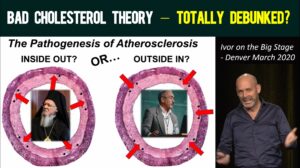FULL EPISODE NOW RELEASED: https://thefatemperor.com/dr-paul-mason-advanced-cholesterol-and-much-much-more-full-podcast-ep26/
Excellent conversation with super well-researched Australian doctor Paul Mason @DrPaulMason – recorded in Boulder, Colorado. We covered so much!
Also I’m trying out a new system suggested by feedback, releasing some particularly information-dense podcasts in multiple parts during the week – for bite-sized viewing. And then releasing full podcast at the weekend, for those who want to pig out on excellent insights, all in one go 🙂
SUBSCRIBE here for latest releases: https://www.youtube.com/channel/UCPn4FsiQP15nudug9FDhluA
Here is the summary of this segment’s content – scroll down for the Transcript:
INDEX/CONTENT PART 1 of 5:
00:00:23 Some insights on the new cholesterol risk factor – Lipoprotein(a) or Lp(a)
00:05:10 Discussion of the role which Oxidised LDL or oxLDL has in heart disease
00:08:32 Glycation damage to LDL – a crucial part of the heart disease problem?
00:09:52 Omega 6 vegetable or seed oils add to the inflammatory cascade of destruction
00:11:17 Oxidized LDL receptors and their place in the system
00:12:33 Gilbert’s Syndrome, Bilirubin and greatly reduced heart attack rates
TRANSCRIPT for PART 1 of 5:
Ivor Cummins 00:00:23 Dr. Paul Mason, finally got to catch up with you – all the way from Australia.
Dr. Paul Mason 00:00:27 Pleasure’s all mine.
Ivor 00:00:29 Excellent, yeah. I’ve been watching some of your videos and they’re superb because you are going through all of the detail of the lipoproteins, but you’ve also got the clinical experience with patients many, many patients where you’re getting to see this in real life play out. So maybe today we’ll talk a little bit around these LDL-P and Lp(a) and some of these advanced lipoproteins and what they really mean.
Paul 00:00:51 One of my favorite topics!
Ivor 00:00:53 Right. So where do we start then? Well, I guess Lp(a) is one that’s becoming very popular out there in the press and a few years ago you’d hardly hear about us. Now I’ve done quite a bit of research on Lp(a), but I think you’ve gone that step further. So maybe the context around Lp(a), when it’s bad from the tie, when it may not be bad from the tie, kind of what it’s all about for someone who gets a high Lp(a) reading.
Paul 00:01:18 Well, I guess my first thought on Lp(a) is that it’s just a surrogate marker. And I guess what I mean by a surrogate marker is that it’s there, but it’s there by association, not by causation. So as you well know, when Lp(a) of the little molecule that Lp(a) uses to attach to the ApoB100 moiety. When that gets secreted, that gets secreted separate to the B100. And it only attaches to the Apolipoprotein B100 (ApoB100) when it’s oxidized. So the existence of lipoprotein(a) by definition reflects the presence of oxidized LDL.
Ivor 00:02:10 So in other words oxidized ApoB100 particles, oxidized LDL particles.
Paul 00:02:16 Exactly! So, if you don’t have oxidation on the ApoB100 moiety of the LDL particle, then the (a) will not attach.
Ivor 00:02:27 Right. So people with low Lp(a), it’s obviously a good sign generally…
Paul 00:02:33 Yeah.
Ivor 00:02:33 People with higher Lp(a) indicates more oxidized lipoproteins, which is not a good thing. But interestingly too, for certain genetic peoples, like I think in Africa, Lp(a) does not associate with worse outcomes at all. And interestingly the Tsimane people with no heart disease really – their Lp(a) I noticed was higher than the Lp(a) in the heart attack men in the 4S Statin Trial. So there seems to be a lot of… it’s still a very ambiguous measure, even though as you say it should indicate a problem.
Paul 00:03:11 Well, I think part of that just reflects that, I guess LDL and you know, “cholesterol full stop,” it doesn’t give us a full risk profile. I mean, it’s not the only factor that’s going to be contributing to cardiovascular disease or stroke risk or something like that. So it’s important that we don’t all of a sudden start looking at cholesterol and LDL, oxidized or not in isolation. If you’ve got other risk factors going on, that’s important too.
Ivor 00:03:39 Yeah. If you have many important risk factors in a good place, then having an isolated one may not really have any impact on the system, yeah?
Paul 00:03:50 Yeah. We’re gonna look at the whole picture here, the whole package and I mean, that’s what I guess mainstream medicine has tried to do with their risk calculators. You know, they say, “Well, how old are you?” “Are you male?” because that increases your risk. “Do you smoke?” And they pack all of these things into their calculator and they come back with a number. Now, unfortunately, a lot of what they put into their calculator is just erroneous. So I mean, they’re looking at total levels of LDL and some of these other things sometimes, but the concept of a risk calculator is actually quite good. It understands that it’s a multifactorial contribution to risk.
Ivor 00:04:27 Yeah. And in fairness, then you put together your factors of choice, and you get a much better risk projection than you would with any single risk factor for sure. Now, I guess, if you do a calcium scan, you’re way better than the old risk factors and the risk calculator put together because it actually sees the disease.
Paul 00:04:44 Yeah.
Ivor 00:04:45 in the absence of getting a scan and actually finding out the disease level and the risk, the risk calculator can kind of fill a gap, yeah?
Paul 00:04:52 Yeah, all the present Lp(a), all oxidized LDL. But just understanding that, you shouldn’t take them in isolation.
Ivor 00:05:02 Absolutely. It’s a multifactorial issue – and picking out a single factor is what a weak engineer might do!
00:05:10 So Lp(a) then does reflect generally oxidized LDLs. I knew they were intimately connected to each other for some time. I also remember having a paper where most of the LDL involved in the plaque was actually of the Lp(a) type as opposed to classic LDL. So that would also tie in.
Paul 00:05:32 Yeah. I mean, I think this just reflects that oxidized LDL is the stuff that will penetrate through the endothelial lining. And that’s the stuff that’s going to form the plaque. If you have a healthy LDL particle that’s not modified, and by modification, I mean either glycation where you have sugar attaching to the B100, or oxidation of the LDL particle, if you don’t have either of those factors there, then it’s just not going to end up in the atherosclerotic plaque. And the reason is because it travels there inside the macrophage. It resides there inside the macrophage, it doesn’t actually travel there. And the only way it gets inside the macrophage is through a scavenger receptor on the macrophage, and those scavenger receptors have no affinity for a healthy LDL particle. It’s not going to stay there.
Ivor 00:06:25 Right. And if you take it back a little further than, Paul in some of the work I’ve been doing recently, so if you take normal non oxidized, non glycated, non damaged LDL particles in your plasma there in your blood, and then you can of course have oxidized LDL’s in your plasma in your blood. A million dollar question is, can ordinary LDL’s go across the endothelium and become oxidized and become microphage-engulfed, contributing to the problem – or is it only oxidized LDL in the plasma, even mildly oxidized, that can really go across the endothelium and become part of the atherosclerosis process inside the wall?
Paul 00:07:06 So I think on the balance, I mean, it’s almost always oxidized that would cross. But I mean, I would hesitate to say that, you know, non-oxidized could never cross. The point is if it could cross, it could come back again. And because it’s not going to be bound up by macrophage.
Ivor 00:07:23 Yes, true. Though they do sometimes. Some lipidologists say, “Once they go in, they can come out – but they will get trapped on proteoglycans.” Like the proteoglycans are trapping your healthy LDL to hold them and oxidize them. That’s one viewpoint.
Paul 00:07:40 I’m not sure that’s substantiated by empirical evidence.
Ivor 00:07:43 Yeah, I do agree. There’s a paucity of evidence conclusively showing that. So oxidized LDL I think you can safely assume, and actually, Paul, I remember I had a few papers from Eastern European teams, not from American teams, where they took oxidized LDL (very mildly oxidized, not the hardcore macrophage level) – and they found that 40% of endothelial cells would die when exposed to these mildly oxidized LDL, but not when they use native LDL. And they also showed entrapment much higher for oxidized LDL, the native LDL. So I guess that would tie in with your belief that oxidized LDL is inherently a driver. A negative LDL is probably not so much something to…
Paul 00:08:32 Ah, for sure. And I think the we can take a step back, and it’s glycation of the LDL which often precedes oxidation. So having high blood sugar levels, that means that you’ve got these LDL particles floating around in this soup and they’re more likely to be exposed to the sugar molecules. And there’s a process called non enzymatic glycation which basically means it’s a concentration driven process. The sugar will attach. And that sugar attaching actually can generate reactive oxygen species. So the very process of glycation in some instances is enough to oxidize that LDL particle. But by being glycated, it also means it can’t be taken out of circulation by the liver so the residency time in the circulation will be prolonged. And obviously, the longer it’s sitting there, then that’s also going to be more likely to be oxidized just on a time perspective. So it’s the glycation and the sugar in the first place that does the damage.
Ivor 00:09:35 And that’s certainly one agent of jack damage. And in the population nowadays, we know in America, around 70% of people are essentially diabetic. So that’s going to be a huge driver of LDL damage in any case.
Paul 00:09:46 Yeah.
Ivor 00:09:48 There are other sources of LDL damage, I guess, but that would be the big one.
Paul 00:09:52 Yeah. Well, I mean, there’s other risk factors that will increase the likelihood. So the omega-6 oils, polyunsaturated oils of the omega-6 variety, they’re much more prone to oxidation. And we know that and there’s some really nice studies out recently where they’re actually looking at the structure of cell membranes, you know, comparing omega-3s and omega-6s, and it really does set it up. So, if you’ve got a longer residency time, and you’ve got these pro inflammatory omega-6s sitting in the membrane, or sitting within the particle (or even in the circulation) you’re going to set yourself up for trouble.
Ivor 00:10:36 And that’s pure synergy, yeah. So you’ve got a combination of vegetable oils excess, which ironically, the heart organizations push, combined, still, amazingly, if you’re listening out there, but also then the excess of glycation from hypoglycemia and postprandial sugar spikes from the kind of sad diets our people are eating. So you’ve got this terrible synergy to damage LDL particles and have them be comparative…
Paul 00:11:04 And then as you said, then they can also damage the endothelial cells.
Ivor 00:11:08 In turn. So we’ve got this…
Paul 00:11:11 … cascade
Ivor 00:11:12 … cascade and self-reinforcing loop I think in some cases. It’s shocking.
00:11:17 So, the other thing is I remember a paper where the LOX-1 receptor in the endothelium, and it also takes part in many parts of the…
Paul 00:11:27 I’m sorry, is that the LOX-1 on the macrophage?
Ivor 00:11:29 Also – same thing. So, I have a paper which I was fascinated by and it basically says that oxidized LDL is the problem and not native LDL. A 2009 paper. But what they showed was the LOX-1 is on the macrophage, the LOX-1 is on the endothelium, taking oxidized LDL from the plasma into the wall – and it’s also involved in around four other places including the macrophage. So LOX-1 is involved everywhere.
Paul 00:11:56 Well, not necessarily. I think there’s actually six separate scavenger receptors on macrophages, LOX-1 being only one of them.
Ivor 00:12:03 Yes.
Paul 00:12:03 And I think there’s another one or two that might actually be able to be involved in that process.
Ivor 00:12:07 Oh, true. There are many and it’s very complex. But I think what this team was saying that even just looking at LOX-1, it comes up in so many parts of the atherosclerotic cascade. But our real point was that it illustrates that oxidized LDL even in the plasma, not just trapped on the wall, is a fundamental part of atherosclerosis and native LDL, they basically pushed aside and said, not relevant.
Paul 00:12:33 Exactly. And it’s probably also worth pointing out here that the reason oxidized LDL is so bad because it can generate something called reactive oxygen species, which are basically unbalanced valence shells electrons, that will then basically go and they’ll do damage to what they come in contact with. And there’s really neat evidence that antioxidants can actually reverse or prevent some of this damage. Not reverse at once you scrambled an egg, It’s a bit hard to undo that.
00:13:06 One of my favorite examples is something called Gilbert Syndrome, which in medical school, that’s an Australian pronunciation, Gilbert (zheel-BAYRS) Syndrome. It’s French. This is actually a condition where you have elevated levels of bilirubin in the circulation, which is a potent antioxidant. And we call this a syndrome, we say, “You’ve got Gilbert syndrome,” but if there’s any one syndrome which I could have, it would be this because it’s actually associated with a significantly reduced risk of cardiovascular disease. Significantly reduced. I think it’s in the order of 50% or something like that. Massive reduction. And purely because I’m surmising here is the antioxidant potential of the bile going around is probably undoing some of the damage of the oxidized LDL particles possibly before they damage other structures.
Ivor 00:14:03 Right. And Gilbert’s is not particularly problematic in itself. I don’t think there’s a lot of morbidity.
Paul 00:14:09 No, it actually reduces mortality. That’s the whole point. Your chance to having a heart attack if you have Gilbert Syndrome is a hell of a lot less than if you don’t. As I said if there’s a syndrome I could have, that would be it.








